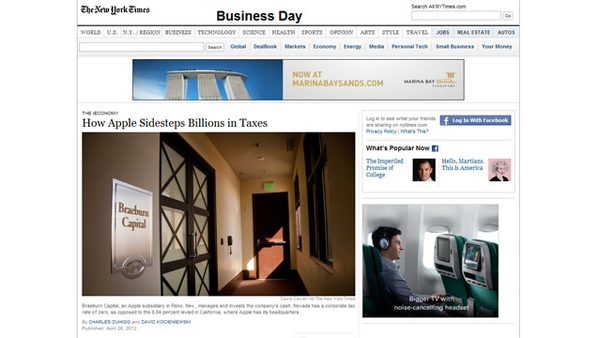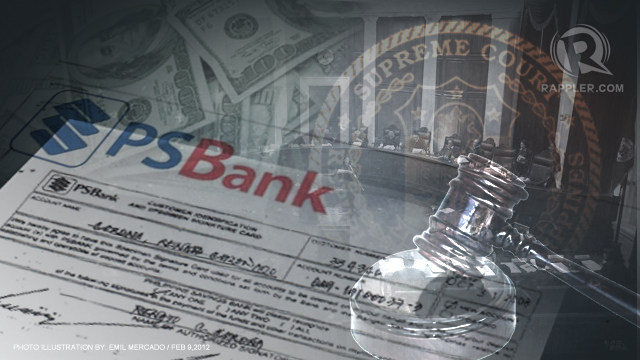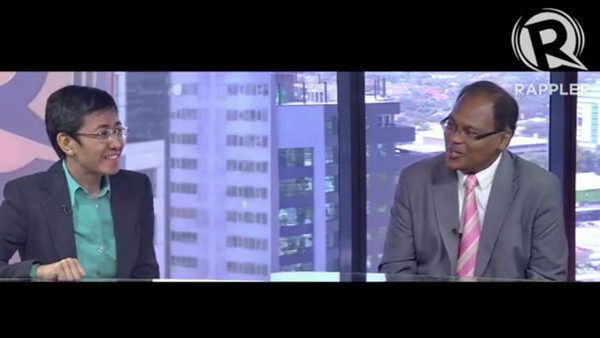SUMMARY
This is AI generated summarization, which may have errors. For context, always refer to the full article.
- Dodging billions of taxes the Apple way

Tax payments that reach US$3.3 billion maybe mind boggling for a company like Apple, which earned $34 billion in 2011. But that translates to only 9.8% tax rate, a far cry from the 24% paid by equally giant global companies like Walmart. Another red flag that triggered a New York Times weekend piece on Apple’s supposed tax avoidance tricks was the growing complaints among many in California, as well as in Cupertino where Apple is building its new spaceship headquarters. These “tricks” reportedly include Apple’s strategy to allocate 70% of profits “outside” the US or in states that impose lower taxes, such as in Nevada, which charge zero corporate tax on an Apple subsidiary that collects the company’s cash. The same is true for sales. Employees who are based in high-tax countries are, in accounting terms, selling Apple products on behalf of subsidiaries located in low-tax countries. And global iTunes are “sold” via Luxembourg, which offers tax incentives for companies that “do business” there, in the process allowing Apple to dodge taxes in US, Frace, Britance and other countries that would charge higher tax rates.
Read more on The New York Times and Rappler. - Ateneo, La Salle, 126 others to hike tuition fees

The bad news is, 126 schools in Metro Manila will increase tuition fees they will collect for school year 2012-2013 by 6% to 10%. The list, which the Department of Education released recently, includes La Salle Greenhills, ST. Theresas College, Philippine Womens University, Miriam College, Ateneo de Manila University, University of Sto. Tomas, ST. paul College, among others. The good news is, the number os schools implementing tuition fee hikes decreased from 136 in 2011. An education official explained that private schools are free to increase fees but understands market dynamics, since making education unaffordable tends to reduce enrollment.
See list of schools hiking tuition fees on Rappler. - Economy is star in upcoming French, Greek elections

May 6 is a week away, and the days before that will likely be filled with insights of how Europe’s economic recovery plan hangs in a balance as two key member-countries, France and Greece, face potential changes at the top. The two countries are still going through fiscal straitjackets as their national economies struggle amid post-crisis reforms. Naturally, these tough austerity measures that have shaken these countries to their core put incumbent candidates in a bind. Francois Hollande is the overwhelming favorite to replace conservative Nicolas Sarkozy in the French polls, while the two main Greek parties, the socialist and conservative, may fail to secure a majority in the Parliament. The status quo may shift, and so will the European union’s long-term reform plans.
Read about the impact of economic concerns on French elections and profiles of the presidential contenders on Rappler.
Read about the Greek elections on Rappler and view slideshow of soup kitchens and elections in Greece. - Thai court to rule on journalist case who ‘insulted’ king

A Bangkok court will rule on the fate of online news editor Chiranuch Premchaiporn who was charged with violating Thailand’s strict lese majeste and computer laws and face 20 years in prison if convicted. This case is closely watched as an innocent verdict could be interpreted as a strategic move towards more tolerance on expressions of freedom in the Internet. A guilty verdict, on the other hand, “would harm the already tarnished image of Thailand as a beacon of democracy in Southeast Asia,” an analyst said. The Thailand King is revered as a demigod by many Thais and criticizing him and his family are largely not tolerated. Several critics, including foreigners, have been put in prison over charges of defaming the king.
Read more on Rappler. - Fine print: How a waiver led to Corona’s dollars

The Ombudsman was able to do what the impeachment court could not (or not yet): access impeached chief justice Renato Corona’s dollar accounts. In an exclusive report of Rappler, the Ombudsman’s access to the foreign currency deposit had 2 key aspects: a general waiver at the back of the Statement of Assets, Liabilities and Networth (SALN) that public officials, including those from the Supreme Court, submit to the Ombudsman, and; the anti-graft office’s access of public official’s bank accounts through the Anti-Money Laundering Council (AMLC). The Ombudsman’s probe of Corona’s assets was triggered by 3 complaints citing alleged violations of anti-graft and anti-money laundering laws. Corona’s lawyers question the Ombudsman’s jurisdiction. They also admitted they were in the dark about this issue since Corona handled the Ombudsman’s probe on his own.
Read on how Ombudsman got access to Corona’s dollars accounts on Rappler.
Read more on the Corona’s defense lawyers’ position about the Ombudsman probe on Rappler. - Philippines loosens up on sea dispute

President Aquino said on Sunday, April 29, that he had issued “overriding instructions” to the military “not to escalate the issue” brewing between Philippine and Chinese troops locked in a 2-week standoff at the disputed Scarborough Shoal in the South China Sea (West Philippine Sea). He added that the Chinese warnings are “not indicative” of Beijing’s “real intentions.” Aquino’s position came amid a high-level contingent’s trip to Washington to convince the United States, to side with the Philippines, a long time ally in Southeast Asia, over this contentious maritime issue. Meanwhile, Sen. Miriam Santiago said the Philippines should not expect the US to take the Philippines’ side since it is economically dependent on China.
Read more on Rappler. - China in US$23-B deals with resource-rich Sudan, Russia

Over the weekend, energy hungry China announced that it will extend a two-year US$8 billion loan to poverty-stricken but oil-rich South Sudan. It also announced that it would be signing US$15 billion-worth investment contracts with Russia. In both nations, these deals involve infrastructure projects, ranging from roads, telecommunications, agriculture, and other investment projects.
Read about China’s loan to South Sudan on Rappler.
Read about China’s investments in Russia on Yahoo News. - Austerity measures may fuel unrest – ILO

Austerity measures in countries going through economic crisis may result in unrest, the International Labor Organization warned on the eve of Labor Day on May 1. It said the reforms that European leaders have crafted and now implementing may have “devastating consequences” since cuts in employment are not combined with job creation, creating the risky environment for unrest. Globally, around 6.1% of population are unemployed, translating into 202 million jobless people. At this pace, another 5 million will lose their jobs in 2013. Already, the streets of Spain are filled with workers protesting job cuts.
Read more on Rappler. - World reflects about Bin Laden one year after death

A year since Osama bin Laden was killed, praise and admiration for Al-Qaeda’s charismatic leader has been muted, but his legacy lives on. With United States responsible for his death, the idea that there is a global battle against Islam has a reserved place in history, an analyst said. Thus, even if Al Qaeda as a group is not as strong as when bin Laden was alive, experts still caution that factions, sometimes working as individuals, are more dangerous than the sum of their parts. A famous example is Anders Breivik, the Norwegian rightwing extremist who killed 77 people last summer, who had studied the methods of al-Qaida and learned to launch an attack which was “very simple, very targeted, very quick and created huge mayhem and destruction.” With the withdrawal of the American and European troops from Afghanistan, more instability would be expected in a year’s time, noted Rohan Gunaratna, the author of “Inside Al Qaeda” and head of the International Centre for Political Violence and Terrorism Research (ICPVTR) in Singapore who talked to Rappler recently.
Watch the interview of Rappler with Rohan Gunaratna.
Read more from Rappler and bin Laden’s legacy on Guardian. - British ethics body set to rule on Murdoch scandal

This Monday, April 30, the British press ethics committee, composed of politicians, is expected to vote and agree on the final report, which will be published Tuesday, May 1. Their verdict on the scandal at his defunct News of the World newspaper comes after Rupert Murdoch, 81, and his son James testified for 3 days last week on the phone hacking issue. Reuters reported that both Murdochs had practice sessions with and coached by top lawyers, including ex-White House lawyer Joel Klein, before the hearings, but the older Murdoch still casually threw out insults at politicians and described himself as a victim of a corporate cover-up.
Read about Murdoch’s tough week ahead and the coaching sessions with lawyers on Reuters.
Add a comment
How does this make you feel?
There are no comments yet. Add your comment to start the conversation.